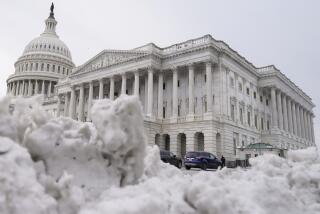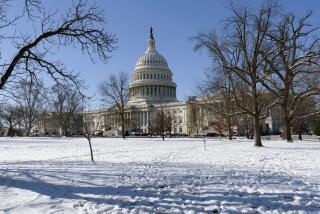President Signs Bill Extending Cigarette Tax
- Share via
WASHINGTON — Congress voted Monday to keep the federal cigarette tax at 16 cents a pack through Nov. 14, and President Reagan subsequently signed the bill into law despite reports that he might veto the measure.
Some lawmakers had predicted that Reagan would veto the extension on grounds that it raises federal taxes and usurps a traditional state source of revenue.
However, Rusty Brashear, a White House spokesman, announced early today that Reagan had signed the bill before midnight Monday, when the new fiscal year took effect. Brashear provided no details or explanation regarding Reagan’s decision to approve the legislation.
Effort to Make Tax Permanent
Without Reagan’s signature on the bill, the tax would have dropped to 8 cents a pack at midnight. Congress wants to make the 16-cent levy permanent, but the effort is being delayed by unrelated issues.
First the House and then the Senate approved the extension Monday without debate or dissent.
The cigarette tax was included in a stopgap bill that also would extend some other expiring provisions of law for another 45 days. Those provisions affect the railroad retirement system, rates of government reimbursement of hospitals and doctors for treating Medicare patients and federal assistance to workers and companies harmed by competition from imported products.
The federal government would have lost about $6 million for each day the cigarette tax was at 8 cents, rather than 16 cents.
17 States Cited
A temporary lapse in the 16-cent cigarette tax would have affected 17 states, whose legislatures have voted to raise state tobacco levies if the federal tax were allowed to drop to 8 cents a pack. Ten of those states would allow the higher state tax to stand even if the full 16-cent federal levy were reinstated.
The federal tax was doubled to 16 cents in 1982 as part of a deficit-reduction plan. At that time, Congress agreed to restore the tax to 8 cents this year, but that pledge has fallen victim to the continued effort to cut the deficit. The House Ways and Means Committee and the Senate Finance Committee have voted to make the 16-cent tax permanent as part of this year’s deficit-cutting legislation.
While the 16-cent cigarette tax was being continued for at least 45 days, the price of drinking went up at midnight Monday as the federal liquor tax increased approximately 10% as the new fiscal year began.
The hike, approved last year by Congress to become effective with the beginning of the 1986 fiscal year today, raises the tax on distilled spirits by $2--from $10.50 per gallon to $12.50 per gallon. The tax is on spirits produced in, or imported to, the United States and does not apply to beer or wine.
$970 Million Through ’87
The tax will raise an additional $149 million in the rest of 1985, $311 million in 1986 and $510 million in 1987.
The end of the fiscal year also passed without Congress enacting into law even one of the 13 regular appropriations bills that set the budgets of various government agencies.
To keep them operating, Reagan on Monday signed a stopgap bill known as a continuing resolution, that extended them at their present funding levels for 45 days, or until Nov. 14.
But while he signed the bill, he urged Congress to enact its regular appropriations bills “without delay--and within the spending limits prescribed by the House-Senate budget resolution.”
Seeks ‘Reasonable Outcome’
Only two of the nine domestic appropriations bills thus far approved by the House fall within the budget resolution, Reagan said, adding: “We will be working with the Congress to achieve a more reasonable outcome.”
He called upon Congress to make the spending bills “consistent with both the need for restraint in domestic spending and support of the defense and international interests of the nation.”
Reagan is expected to sign other emergency legislation today, passed by Congress Monday, extending by 45 days the nation’s milk price-support system. The action is necessary because the current four-year farm law expired Monday and Congress has yet to pass a replacement.
More to Read
Sign up for Essential California
The most important California stories and recommendations in your inbox every morning.
You may occasionally receive promotional content from the Los Angeles Times.













